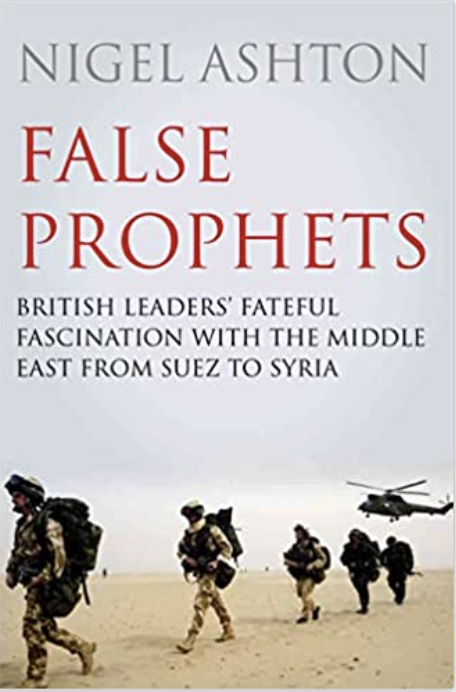
Pride and Arrogance



Britain shaped the modern Middle East through the lines that it drew in the sand after the First World War and through the League of Nations mandates over the fledgling states that followed. Forty years later the Suez crisis dealt a fatal blow to Britain’s standing in the Middle East and is often represented as the final throes of British imperialism. False Prophets is an insightful and compelling book, revealing how successive prime ministers have all sought to extend British influence in the Middle East and their actions have often led to a disastrous outcomes.
Ex-prime minsters Anthony Eden and Tony Blair whose reputations have been ruined by their interventions in the region took significant risks in deploying British forces to the Middle East, with an unspoken assumption that Britain could help solve its problems, even if only for the reason that British imperialism had created the problems in the first place.
Nigel Ashton frames his lens of Downing Street and explores the reasons why British leaders have been unable to resist returning to the mire of the Middle East, the world’s most hydrocarbon-rich, but politically volatile region while highlighting the misconceptions and the legacy of history that has fuelled their pride and arrogance. He reveals how their fears and insecurities made them into false prophets who conjured existential threats out of the sands of the Middle East.
Leaders are blessed or cursed by the decisions of their predecessors and the forces that appear to dictate national priorities and by the responses to their actions by actors whose calculations, and motivations, lie outside their control.
Ashton highlights key events that dominate the narrative of British engagement with the Middle East, from the Suez War of 1956 to the invasion of Iraq in 2003, driven by prime ministerial action and initiative. In some instances, bad decisions with negative outcomes were driven by prime ministerial passion. Eden was obsessed that the Egyptian leader Abdel Nasser was a new Mussolini who placed his hands on Britain’s jugular vein when he nationalised the Suez Canal in July 1956. It was a view that drove him to mount an illegal attack on Egypt in secret collusion with Israel and France. Eden’s obsession was initially shared by his successor Harold Macmillan, who thought that without oil and its profits neither Britain nor Western Europe could survive. Macmillan had to backtrack when as chancellor he realised that the US, which opposed the action, could undermine the Sterling, causing the British economy to collapse.
Attacks on New York and Pentagon on September 11, 2011, we find similar obsession on the part of Tony Blair, the British are slavishly following the Americans, with the UK prime minister allowing himself to be persuaded by Dick Cheney, US vice-president, and other White House Hawks that an act of terrorism such as 9/11 and chemical or nuclear weapons of mass destruction presumed to be held by Saddam Hussein in Iraq was somehow linked, despite the absence of any evidence. Ashton’s view is that Blair “ believed that the nexus of WMD and international terrorism would define the 21st century, a belief which remains unvindicated two decades later.
Harold Wilson, James Callaghan, and Margaret Thatcher, old enough to have seen the horrors of Nazism, attitudes were influenced by an attachment to Zionism and Israel. Macmillan and Alec Douglas Home and Edward Heath, “ the belief that Britain’s future safety and wellbeing depended directly on developments in the Middle East was deeply ingrained.”
John Major who came to office in 1990 with the least experience of the Middle East in the midst of the Gulf crisis following Saddam Hussein’s invasion of Kuwait, avoided the post-imperial hubris of most recent Downing Street lodgers. David Cameron failed to persuade parliament to intervene in Syria and stumbled into difficulty over Libya. Inspired by humanitarian concern, Major quietly played by the UN rules. His legacy is the safe haven he secured for the Kurds against Saddam’s genocidal regime in northern Iraq.
False Prophets: British Leaders’ Fateful fascination with the Middle East from Suez to Syria by Nigel Ashton.
